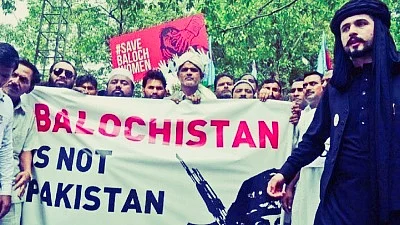If reports that casualties in Galwan were at least ten times higher than admitted by the Chinese was a newsmaker, look to the west for a mirror example.
It seems the Pakistan-China relationship is even closer than thought of, as the one parades a Galwan ‘hero’ at the prelude to the Olympic games, and Prime Minister Imran Khan lauds the fallen soldiers while quietly skirting the facts.
As Baloch militants attacked their tormentors in two separate incidents, the Pakistanis were not only contradicting themselves on the number of casualties, but completely at odds with clear ground reporting that the attacks had been very severe indeed.
Pakistan Forces Faced Deadly Attacks but How Many Died?
The double attacks on 2 February, were launched against camps of the security forces in Panjgur and Nushki. The Baloch Liberation Army not just claimed them, but also declared that its Majeed Brigade were in occupation of the former for more than 30 hours.
That operations were continuing well after that period was evident from reports nearly two days later, and as of the time of writing.
Interior Minister Sheikh Rashid soon began the fancy footwork by saying that four soldiers were martyred. But an advisor to the Balochistan government said that 12 security personnel had been killed and 23 soldiers injured.
The BLA and media both noted that the Nushki operation took over 20 hours, with the insurgents claiming a hundred soldiers and officers dead at the latter alone. Given that reports noted militants' use of explosives-laden vehicles, and heavy use of retaliatory air power by the Pakistani Air Force, there is reason to believe that total casualties were far closer to the BLA claim than that of the head of Inter Services Public Relations.
Twitter was awash with hashtags of not just the operations, but also #BalochistanisnotPakistan. The bitter divisions were up for all to see, one praising the BLA and the other the Pakistan army.
Balochistan's Circle of Violence
Soldiers anywhere are not to be blamed or condemned for such operations. Indeed, the picture of a young Captain killed in the attack by the Baloch Liberation Army, evokes only sadness at a life cut short, that too, in fighting his own countrymen—at least according to Islamabad’s sense of geography.
The Baloch Liberation Army which claimed the attacks see the ‘Punjabi’ army as alien, and, indeed, have fought for independence since the inception of Pakistan itself. The history of how the Baloch were tricked and pummelled into joining the Pakistani state has been recounted elsewhere.
But, what is evident is that its people, whose tribes have sadly have fought among each other in the past, have now a strong ethnic identity made stronger by the various operations launched by the Pakistan army. In simple words, the more they fight, the stronger they are knit together. Besides, there is a question of pure and simple survival. With the Chinese virtually in possession of vast tracts of rich fishing land in Gwadar—now equally rich real estate—and the Pakistani security forces lifting thousands of Baloch youth and ‘disappearing’ them, there is little choice left.
A Whodunnit of Global Proportions
As was inevitable, the Pakistani establishment was quick to blame India and Afghanistan for all of this, claiming intercepts between handlers and the militants. But there is a problem here. The BLA itself is not just shadowy, with uncertain leadership, but has in the past denied claims of attacks by its cadres, including the June 2020 Karachi Stock Exchange ostensibly by the very same “Majeed Brigade’.
Meanwhile, matters on the ground are illustrative. In recent times, Pakistan has been taking strong action against Iranian-supported groups in its bordering areas, even while there have been frequent clashes between the two security forces.
Baloch insurgents continue to operate, despite Islamabad fencing its border with Iran, as well as Afghanistan.
Meanwhile, experts also observe that the UAE is taking steps to evict Baloch dissidents, after Islamabad linked them to Iranian covert activities. Islamabad, however, omits to mention that its sponsored groups like Jaish ul Adl have time and again attacked the Iranian security forces, leading to Tehran conducting its own surgical strike to free captured border guards.
Then, there is the fact that Baloch attacks have certainly gone up after the US left Afghanistan. The Taliban are either not able or willing to act against Islamabad’s primary nemesis.
Pakistan's Balochistan Problem is Here to Stay
In sum, it appears that Islamabad’s various adventures have turned against it, just as a former US Secretary of State had once said. At the time, Hilary Clinton had famously warned her counterpart Hina Rabbani Khar “You can't keep snakes in your backyard and expect them only to bite your neighbours”.
Not that the Baloch can be classified as reptilian by any measure.
Its just that they’ve been stung just too often, and there are neighbours around who know just how they feel. It’s a tragedy that association with Iran is likely to harm the Baloch cause rather than elevate it as a human rights catastrophe.
(Dr Tara Kartha is a Distinguished Fellow at the Institute of Peace and Conflict Studies (IPCS). She tweets @kartha_tara. This is an opinion article and the views expressed above are the author’s own. The Quint neither endorses nor is responsible for them.)
